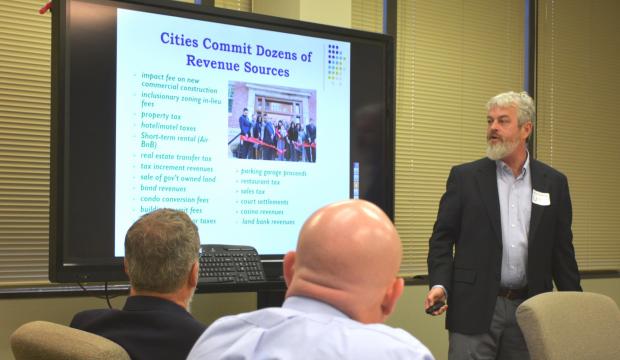February 15, 2017. Topeka Capital-Journal.
A group of about 35 people representing local churches, businesses and government entities listened to a national expert on affordable housing trust funds describe how such an initiative might work in the capital city during a breakfast meeting Wednesday in downtown Topeka.
Michael Anderson, director of the Housing Trust Fund Project for the Washington, D.C.-based Center for Community Change, told attendees affordable housing trust funds already were operational in some 770 communities across the U.S. and were making it possible for low-income people in those cities to live in their own homes.
Anderson said affordable housing trust funds are typically supported by both private and public dollars.
The key to making them work, he said, is that the trust funds are tailored to individual cities and operated by people living in those communities.
Anderson made his remarks at a meeting convened by the Topeka Justice Unity and Ministry Project (JUMP) organization. JUMP is a social justice program supported by 19 Topeka congregations.
Among attendees at Wednesday’s meeting were Mayor Larry Wolgast; Councilwoman Karen Hiller; the Rev. E.T. “Tom” Watson, of El Shaddai Ministries Community Church; the Rev. Roger Neufeld Smith, of Southern Hills Mennonite Church; the Rev. Anthony Divers, of Inward Faith Outward Ministries; and Garry Cushinberry, of CoreFirst Bank & Trust.
Anderson stressed that the trust funds, which can help low-income people pay for their housing, must have funding sources that are “dependable, predictable and sufficient.”
He noted cities across the nation have taken creative approaches to funding the trusts. In Evansville, Ind., proceeds from a sale of city-owned property went to the trust funds.
In Seattle, he said, voters approved a measure that increased their taxes to provide public dollars to the affordable housing trust fund in that community.
Anderson also pointed to Des Moines, Iowa — another Midwestern capital city — as an example of how affordable housing trust funds can be successful.
In addition to people who would qualify for the program, communities also would benefit, particularly with construction projects contributing to local economies, Anderson said.
“This is something that’s on the mind of the public,” Anderson said. “I think all of us know our community is stronger when people have a place to call home.”
Topeka JUMP leaders say more than 7,000 low-income families in the capital city have a severe housing need. JUMP is suggesting implementation of city policy and funding changes to establish a housing trust fund for low- to moderate-income families, especially those making less than $25,837 annually.
“There is a need to address a serious concern,” said Shanae M. Elem, lead organizer for Topeka JUMP. “Good work is happening, but it’s just not enough.”
Topeka JUMP is backing a plan that can support construction of new affordable single-family homes and apartments, rehabilitation of homes to revitalize neighborhoods, rent subsidy for the lowest income levels, education and support programs for landlords and tenants, and other social service needs.
Elem said funding — which could be millions of dollars — presents perhaps the biggest challenge to implementation of an affordable housing trust fund in Topeka.
However, she said, funding from various public and private sources can be combined and “leveraged” in such a way as to generate additional money.
The wheels already have begun to turn in developing a viable affordable housing trust fund in Topeka, leaders at the meeting said.
Topeka JUMP officials said Wolgast made a commitment in May 2016 to work on developing a plan to address the city’s housing needs.
Since that time, Wolgast said, an Affordable Housing Task Force has been started. Individuals and groups interested in Topeka’s housing needs have taken part, including representatives from Housing and Credit Counseling Inc.; the Topeka Housing Authority; Cornerstone; the Topeka Rescue Mission; a Topeka landlord association; and other neighborhood groups.
“We’ve had an excellent response,” Wolgast said. “These people are there every meeting. That shows the interest is there.”
Wolgast said topics addressed by the task force to date have included code compliance concerns and absentee landlords.
He said a landlord rental registration similar to that of other Kansas cities is being discussed for Topeka.
At the outset of Wednesday’s meeting, several local church leaders told stories of people in their congregations who had faced hardships as a result of not being able to afford housing in Topeka.
Pastor Watson, of the El Shaddai church, said people of various backgrounds and circumstances face housing problems.
“It’s not just poor and impoverished and disenfranchised people,” Watson said. “It’s also young professionals with limited incomes.”
View original article.






